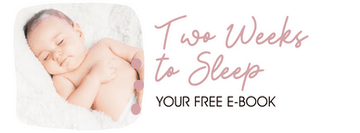
Navigating the 8 Month Sleep Regression...
We know what you’re thinking... "A REGRESSION THAT LASTS 2 MONTHS!?"
Don't worry, this sleep regression doesn’t actually last for 2 months, it just means that it can happen anytime between 8 to 10 months of age. And luckily, unlike the 4 month sleep regression, this one is only temporary!
In this article:
- What is a sleep regression?
- Signs of the 8 month sleep regression
- What causes this regression?
- How long does this regression last?
- Is it the 8 month regression or something else?
- How to survive the 8 to 10 month sleep regression
We can help you through your baby’s sleep regressions!
Get ongoing, personalized support from certified Sleep Consultants in our Village. Say "yes" to better sleep!
Choose your Sleep Solution
What is a sleep regression?
A sleep regression is a period when a baby or toddler who has been sleeping well suddenly starts waking at night, being difficult to settle and/or skipping naps. This is a natural and normal change for your baby, but it can be a distressing time for parents.
Your baby will go through a number of sleep regressions in the first 2 years of their life, which you can find out more about HERE.
A key part of moving through these sleep regressions successfully is understanding what causes them, and what’s happening with your baby at this time.
Signs of the 8 month sleep regression
The main sign that your little one is going through a regression is that their sleeping pattern takes a turn for the worse, but some specific signs to look out for include:
- Waking more in the night and staying awake for ages
- Increased fussiness
- Your baby can no longer self-settle or resettle between sleep cycles like they did previously
- Refusing to nap
- Crying or protesting when settling at naps or at bedtime
- Increased separation anxiety
- Your baby is reaching new milestones like crawling, pulling to stand, walking, talking etc.
What causes the 8-10 month sleep regression?
As we mention in our sleep regression article, regressions are developmental phases that all babies go through. The 8 to 10 month sleep regression is largely due to leaps in your little one's physical and mental development.
Physical Development
Between 8-10 months of age your baby is going through a massive period of neurological and physiological development. They’ll be learning to crawl, pulling to stand and finding their voice, amongst other things. Your little one is a busy bee, this means they will often want to wake in the night to practise their new skills!
Say goodbye to sleepless nights.
Join over 800,000 families worldwide who are enjoying excellent sleep with our Sleep Programs, created by experts in the field of pediatric sleep.
Choose your Sleep Solution
They can also be too stimulated to fall asleep easily. Picture this - you’ve just come out of a long meeting where you've have had to take in a whole heap of new information and you try going to sleep straight afterwards. More than likely, it isn’t going to happen because your brain is far too stimulated and busy trying to process everything you've learned that day. The same goes for our babies!
Mental Development
Your little one is now much more alert and aware of their surroundings and may also start experiencing separation anxiety.
At this age, babies can start to tell one adult from another and have also developed the concept of object permanence. Object Permanence is the understanding that objects continue to exist even when they cannot be perceived (seen, heard, touched, smelled or sensed in any way.)
In the earlier months of your baby’s life, you may have noticed that your wee one liked to play peek-a-boo. This is because, in their minds, once you disappeared from their line of sight, you quite literally vanished and then re-appeared again - the best trick in the book!
For older babies though, this is no longer the case. Now, you may notice that your little one becomes clingier and cries when you leave them. This is because when you leave them, they now understand that you're still there somewhere, just out of their sight, and naturally, they want you to be with them instead!
How long does the 8 month regression last?
So you’ve gone through the trials and tribulations of the 4 month sleep regression and you’ve made it out the other side, but now you’ve been faced with yet another regression! Don’t worry, unlike the 4 month sleep regression, this one is only temporary and usually only lasts for a few weeks, on and off.
However, if new sleep associations creep in during this regression, it can last a lot longer! A sleep association is something that your baby comes to rely on to fall asleep - you can read more about sleep associations HERE.
During this regression your baby may be more difficult to settle, so it's very easy to start patting, rocking or feeding your little one, to help them fall asleep. In just a few days though, your baby can come to rely on that method to fall asleep and will now need that sleep association replicated every time they wake between cycles.
In this situation, you'll need to gently guide your little one back to self-settling again before their sleep can improve.
It is the 8 month sleep regression or something else?
There are other things that happen at this age that can also affect your baby's sleep, such as:
Nap Transitions
Somewhere between 6-8 months old your baby should transition from 3 naps a day, down to 2. During this period, your baby may have difficulty settling at bedtime or start to wake more overnight, as they adjust to their new sleep pattern.
If your baby is still having 3 naps a day and their sleep suddenly takes a turn for the worse between 8-10 months of age, chances are they are ready to drop their third nap now. You can find out more about this nap transition, and how to help your baby through it, HERE.
Teething
Teething often gets the blame for a baby's sleep challenges but the truth is, teething is usually a short lived nightmare! Unless you can actually see or feel the teeth breaking through the gums, teething probably isn't the cause of any sleep disruption for your little one - especially if it's been going on for more than a week.
Do sleep regressions ‘ruin’ the sleep training you have already done or plan to do?
The answer is not at all! Now, just to clarify, by "sleep training" we mean establishing a consistent nap routine for your baby and guiding them towards the skill of self-settling when they are ready.
Establishing a consistent routine and positive sleep habits early on is well worth the effort because it can actually help you and your baby through tricky periods like sleep regressions and nap transitions. You'll be able to quickly identify when something like a sleep regression is occurring because you will easily recognise the changes in your baby’s sleeping habits.
During a regression it can be a little more tricky to follow a routine or schedule, but making sure your baby's awake windows and nap lengths are spot on for their age will help a lot when it comes to their settling and sleep.
How to survive the 8 to 10 month sleep regression
We know it probably feels like it’s just one regression after another, but it helps to remember these are natural developmental periods in your baby’s life that are necessary for their growth and development.
Let's get your little one's sleep sorted ASAP!Our award-winning Sleep Programs will solve your baby's sleep challenges in no time. Take advantage of our new low prices while they last!
Choose your Sleep Solution
Yes, the 8 month regression can be tough, but you've already pulled through the 4 month regression (which is no easy feat!) and there are plenty of things that you can do to help you and your little one through this regression as well:
- Remember that this is just a short phase and it will be over in a matter of weeks
- Try to avoid creating new sleep habits/associations that will be hard to shake off later
- Stick to your routine as best you can and make sure your baby's naps and awake times are age-appropriate. Our Little Ones App can give you a helping hand with this!
- Sleep your baby in a totally dark room, with white noise playing.
- Have a consistent and relaxing bedtime routine in place.
- Support and reassure your baby, but continue to give them the chance to self-settle.
- Allow for lots of physical and mental stimulation during their awake time in the day.
Sleep regressions are in no way easy, so if your little one’s sleep has gone haywire during this regression, remember we are here for you and our Little Ones App can help you get back on track in no time!

Receive product and services updates, promotional offers and other marketing communications based.





